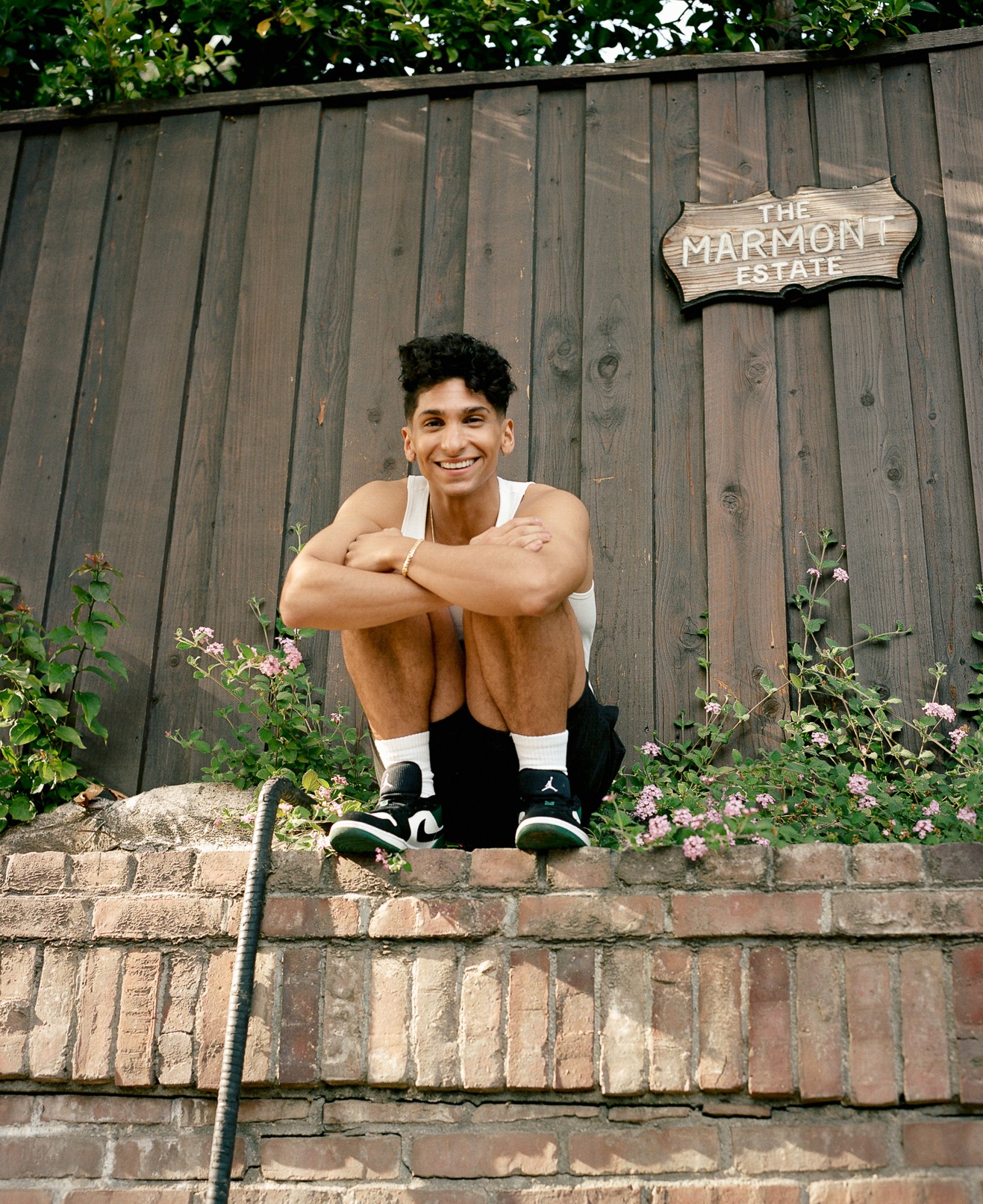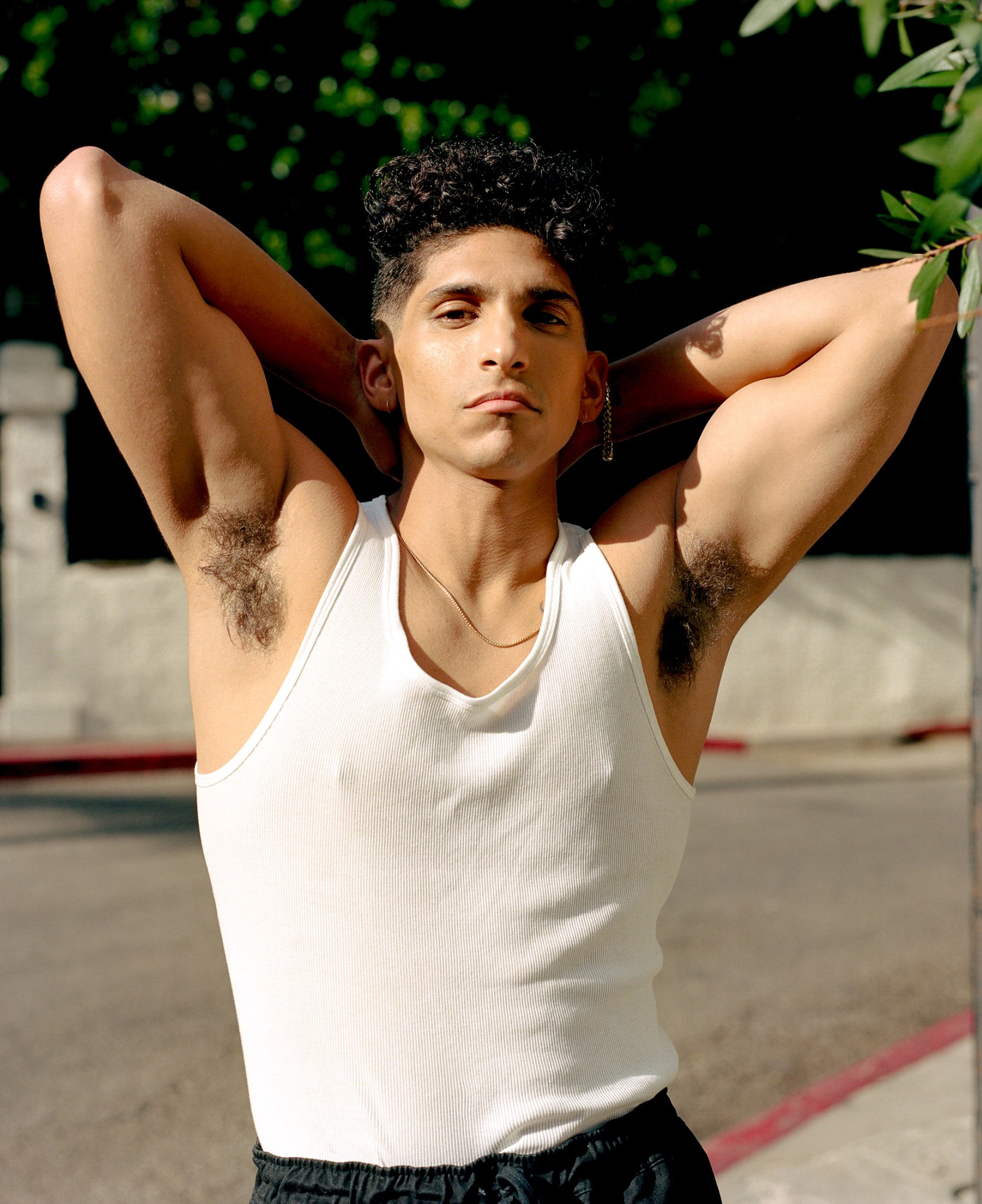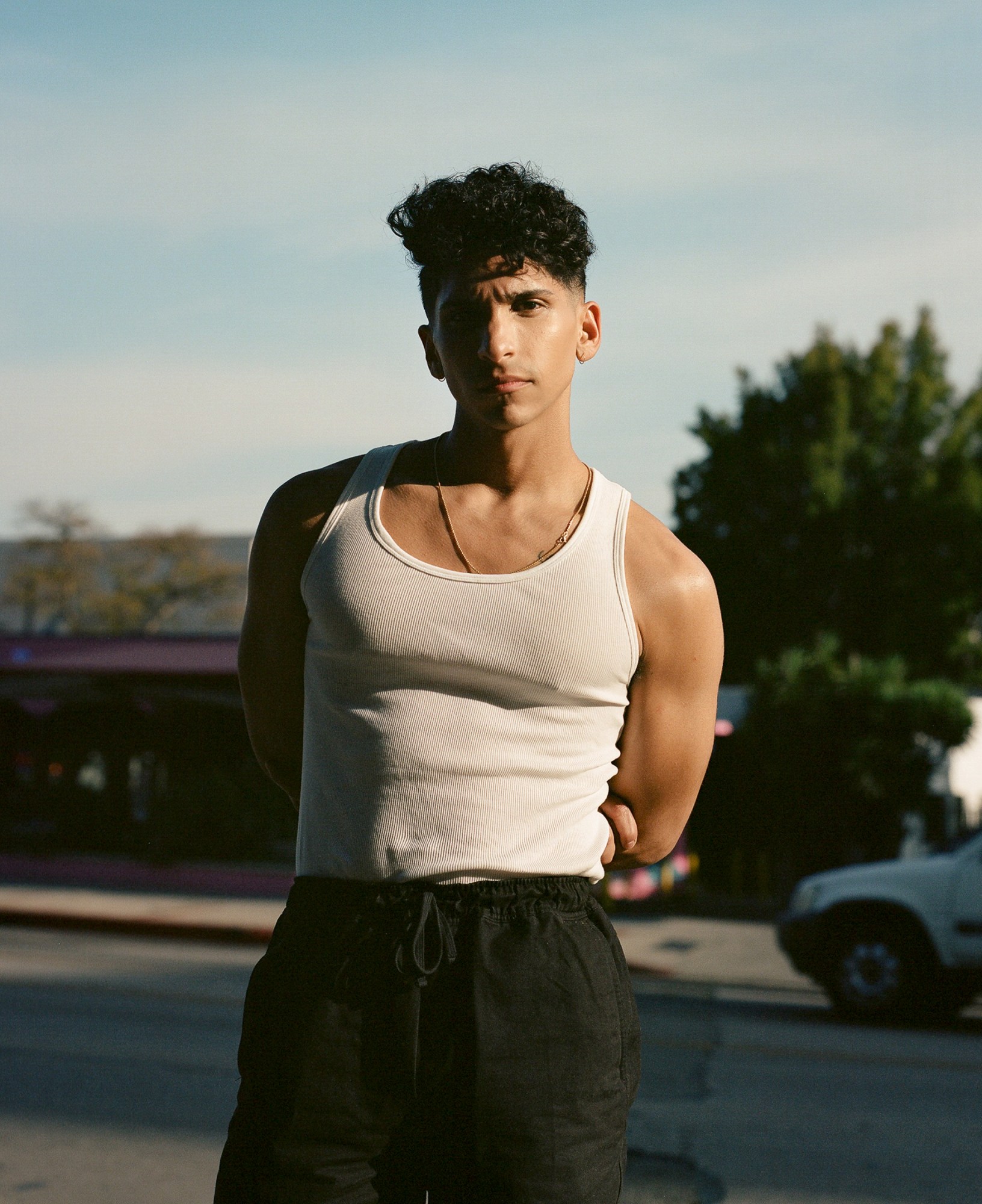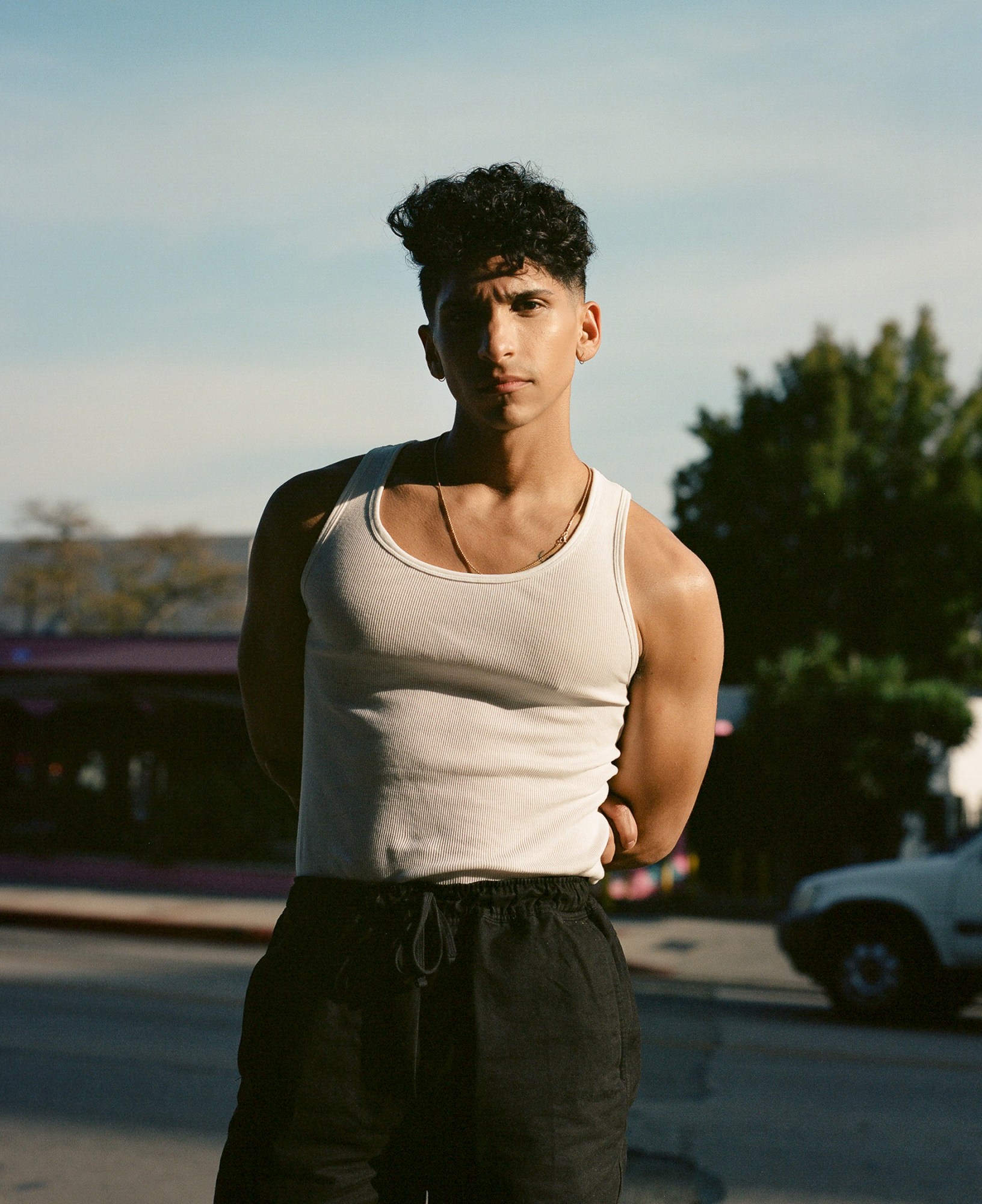How do you mourn the loss of something that changed your life forever? This is the question Angel Bismark Curiel, the star of FX’s Pose, is trying to answer.
It’s been three years since the 25-year-old actor won the role of a runaway street kid called Lil Papi on the show, about a culture — New York’s voguing scene in the 80s and 90s — he then knew almost nothing about. Today, that culture, and the trans women and queer femmes who run it, have shaped who he is in the real world. Ample time watching these folks thrive from the sidelines of the ballroom floor has made him wonder what life might look like without their guidance.
It’s a Wednesday morning in Los Angeles when Angel enters our call, so punctual he beats his publicist. In just over a week’s time, Pose — the TV show that made him a star and heartthrob to its millions-strong global audience — will air the first episode of its third and final season. Since 2018, the show has captured a fictionalised version of life in New York’s queer underground, focussing on the stories of characters who’ve long been sidelined in mainstream media. Its concluding chapter will start the undoing of what seems like Angel’s safety net, having dedicated himself to the show since he was cast, going on to become a mainstay presence in the found family — the House of Evangelista — that it centres.
This is likely the last time that family — which includes actors Indya Moore, MJ Rodriguez, Dominique Jackson and Emmy Award winner Billy Porter — will occupy the same screen, playing the characters that are so dear to them.
“I love these people, you know?” Angel says, retreating a little into a burgundy sweater, sat cross-legged on the floor of his apartment. “I very much feel like a kid that’s being sent off to college now. I spent so much time with that family and now it’s like, ‘It’s time for you to grow up now. Go and do other things’, and that’s exciting but you’re also like…”
He takes a second, tilts his head back and looks off camera, ruminating upon a reality that’s still sinking in. Crying, he composes himself in silence, then speaks through soft tears: “But I love my home. I’m going to miss my home. A very big piece of me is getting left behind.”
In some ways, Angel’s life has been a consecutive string of farewells. He was born in the Bronx before moving to the Dominican Republic. At seven he left for Miami with his mother and sister, moving to Liberty City, a diverse, working class neighbourhood that was also once home to Moonlight’s Barry Jenkins. From there, his high school life — one shaped by his class clown behaviour and truancy — almost led to a life in the military. But drama, first used as rehabilitation for his bad behaviour, drew him in. He recalls the words his father claims Angel once said to him as they parted ways all those years ago: “I looked at him, and as he was crying I said: ‘Don’t worry dad, I’m gonna go to the States, I’m gonna be a big actor, and I’m gonna find you one day.’”

His keeping of these promises is almost entirely down to the role Pose has played in his life. Three years into studying drama at New York’s Pace University (his fourth home in two decades), he auditioned for Lil Papi’s part. It was paid work on a network production with a budget (prior to this he had appeared in short films and sleeper movies at film festivals) but the show’s deeper meaning, its revolutionary quality, hadn’t quite struck him back then.
“I had no day-to-day interactions with trans people,” he recalls, looking back upon a time that feels strangely detached considering how he perceives their culture today. “Based on what I was able to pick up from the audition, it was like ‘Aw man, this is some powerful storytelling’. These folks were trying to get together and centre themselves; that I understood very, very clearly.”
He read books, like trans pioneer, Pose director and now-girlfriend Janet Mock’s memoir, and watched Jennie Livingston’s formative classic Paris Is Burning. “But a lot of [my appreciation for this culture] started to happen when I was on stage with these beautiful trans women and femmes,” he says. “I got to hear their stories and struggles, and where they were just a few days prior to booking this series.”
Papi’s peripheral part drifted into the centre as the show’s narrative progressed: he was emblematic of the community’s empathetic spirit, brought under the wing of house mother Blanca (played by MJ) who sees a lost soul in him. He is a product of a broken environment who needs help, despite the fact his gender identity and sexuality make his experiences different from those who occupy much of the show’s spotlight.
In its second season, he and Indya Moore’s character, also called Angel, fall in love. Together, they represent the possibility of changing perceptions: their love is universal; aspirational.
Angel still feels undeserving of such a responsibility. “On set, I get into a black hole of thinking too much. Am I doing enough? Are people going to receive this level of emotion? Am I good enough, as a cisgender straight dude, to be given this gift of telling a story between a cis man and a trans woman of colour? Am I worthy of handling this with such care so that we can hold space for other men to be able to say, ‘I don’t care what the outside world is thinking — I love this woman?’” By the time the storyline came around, Angel had no qualms about that. In his relationship with Janet, what happened informed his real life character.
In Pose’s third season, we meet these characters again in 1994. Billy’s character Pray Tell is grappling with his HIV diagnosis as it cripples his mental state. Blanca is a nurse in a New York City hospital, in love with her new partner Christopher while trying to pull Pray Tell back from the brink. And Papi — still running an inclusive, successful modelling agency that lifts up trans women — is navigating a rocky patch with Angel, who doesn’t seem to be the main object of his affection anymore.
In episode one, the House of Evangelista gather to watch the pursuit of OJ Simpson by police after the murder of his ex-girlfriend, Nicole Brown Simpson. Conversations among them turn to how race and assumed guilt are intrinsically tied, but also how the privilege of wealth and support of white allies can absolve wealthy people of that guilt, regardless of their race. It’s proof that Pose’s creators have been showcasing these vital conversations for years as a vital part of their framework. Meanwhile, many of the show’s on-screen contemporaries have been rushing to ‘do the work’ after years of negating the importance of diverse talent both behind and in front of the camera.
For Angel too, even before the events of last summer, Pose’s set had always been a safe space. “It feels kinda crazy to me, walking into a show that I knew would have a Black and brown ensemble, that I would not even fathom that the writers, producers and crew would be Black and brown too,” he says. “We kept building off of that. Particularly this season, after we came back. We made it a point that we wanted more Black PAs, more Black folks in hair and makeup trailers that were familiar with our skin and hair textures. There was always a sense of safety, but it grew bigger and bigger as these things outside of our set were taking place.” Between takes, typically throwaway conversations between cast mates would often, instead, hold weight. You get the impression that this communal experience as a group that trusted each other has healed him somewhat.

In conversation, Angel is pleasant company: affable, has a desire to listen and possesses a sincerity that’s rarely found in interviews. Who taught him this? Before he answers, he offers a gracious thank you for recognising that. “I grew up, for the most part, with a single mother,” Angel says. “I think that brought out a want to be genuine and sincere, because it’s something I strived to have with her. Sometimes I wasn’t able to find it. There were moments in which, if I was persistent enough and sincere enough, I could listen to her and gauge [her thoughts], and that could trickle off into my other relationships…”
But this is a minor gripe for someone who otherwise prioritises family and appreciates their support. Though he lives in LA now, he still considers Miami home. Pre-pandemic, he’d visit a few times a year to catch up with his loved ones: mother, sister, aunts, uncles, cousins (“all 50 of em!” he says).
“I’d love to go so much more because time with family is sacred and scarce. If it were up to me, I’d selfishly uproot my mother and sister’s life and bring them with me wherever I went.” A few hours after our call, he’ll get his second coronavirus vaccine. He smiles. “I told myself once I’ve had the second, I’ll feel comfortable holding space with my mom without feeling guilty about it.”
He jokes about the prospect of being “technically unemployed” now that Pose is over; that he has the freedom to go home, but also to seek out new opportunities. The industry is shaped in this show’s image; a new benchmark for how to tell stories of folks whose voices are seldom heard.
“Pose opened the gate,” Angel says, a little bittersweet. “They cracked the door open for more shows to come in and do the same, if not better. We have these pockets of individuals who were all collectively part of this series who can go ahead and say, ‘This is what a set should look like. This is what storytelling should look like. I have a platform now, or a foundation and understanding of what it can look like. Now let me go off and do it with my own point of view.’ That’s what we want. To keep spreading what we’re doing on this show, because it brings a lot of understanding, joy, peace and happiness.”
In Papi, Angel Bismark Curiel found a boy he grew up alongside. How grateful he is to have spent three years playing him. “He’s perhaps one of the greatest men I’ve ever known,” he says. “And I was just a mere mortal, trying to fill his big shoes.”

Season three of Pose starts this Sunday 2 May at 10pm ET/PT on FX. Follow i-D on Instagram and TikTok for more on queer culture and TV.
Credits
Photography Jaden Walker
Grooming Autumn Moultrie


